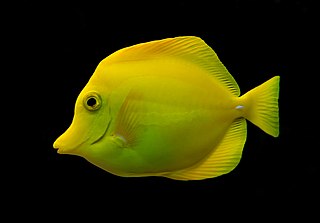
The yellow tang is a saltwater fish species of the family Acanthuridae. It is one of the most popular marine aquarium fish. It is bright yellow in color, and it lives in reefs. The yellow tang spawn around a full moon. The yellow tang eats algae. The yellow tang has a white barb, located just before the tail fin, to protect itself.

Parrotfishes are a group of about 90 fish species regarded as a family (Scaridae), or a subfamily (Scarinae) of the wrasses. With about 95 species, this group's largest species richness is in the Indo-Pacific. They are found in coral reefs, rocky coasts, and seagrass beds, and can play a significant role in bioerosion.

The green humphead parrotfish is the largest species of parrotfish, growing to lengths of 1.5 m (4.9 ft) and weighing up to 75 kg (165 lb).

The marbled parrotfish, also known as the seagrass parrotfish, is a species of marine ray-finned fish, a parrotfish from the family Scaridae and is the only known member of the genus Leptoscarus. It has a wide Indo-Pacific distribution and is also found in the southeastern Atlantic Ocean. It is a coastal species found in beds of sea grass and seaweed.

The silver drummer, also known as the buff bream, buffalo bream, buffs, common buffalo bream, drummer bream, Southern silver drummer or Sydney drummer, is a species of marine ray-finned fish, a sea chub from the family Kyphosidae. It is found in the southeastern Indian Ocean and the southwestern Pacific Ocean off Australia and New Zealand where they are found in shallow water near rocky reefs.
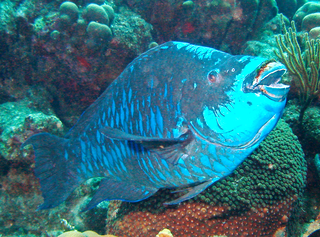
The midnight parrotfish is a species of parrotfish that inhabits coral reefs mainly in the Caribbean, Bahamas, and Florida.

The princess parrotfish is a species of marine ray-finned fish, a parrotfish, in the family Scaridae. It is typically 20 to 25 centimetres long, found in the Caribbean, South Florida, the Bahamas, and Bermuda. Its behavior, similar to other parrotfishes, is to swim about the reef and sandy patches during the day, at depths between 3 and 25 metres, scraping algae on which it feeds.

The stoplight parrotfish is a species of marine ray-finned fish, a parrotfish from the family Scaridae, inhabiting coral reefs in Florida, Caribbean Sea, Gulf of Mexico, Bermuda and as far south as Brazil. It mainly feeds on algae by scraping and excavating it with its teeth. Like most of its relatives, it is able to change sex.

Cetoscarus bicolor, also known as the bicolour parrotfish or bumphead parrotfish, is a species of fish belonging to the family Scaridae. It is found only in the Red Sea.

Naso lituratus is a species of fish in the family Acanthuridae, the tangs and unicornfishes. Its common names include barcheek unicornfish, naso tang, and orange-spine unicornfish.
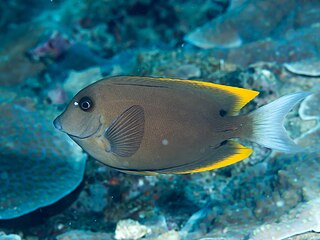
Ctenochaetus tominiensis, known commonly as the Tomini surgeonfish among other vernacular names, is a species of marine fish in the family Acanthuridae.

The queen parrotfish is a species of marine ray-finned fish, a parrotfish, in the family Scaridae. It is found on reefs in the tropical West Atlantic Ocean and the Caribbean Sea. Other common names include blownose, blue chub, blue parrotfish, blueman, joblin crow parrot, moontail, okra peji and slimy head. The young males and adult female queen parrotfish are a reddish-brown color, and quite different in appearance from the bluish-green color of the final phase male. This is a common species throughout its range and the International Union for Conservation of Nature has rated its conservation status as "least concern".

The blue parrotfish is a member of the parrotfish genus Scarus. It is found on coral reefs in shallow water in the tropical and subtropical parts of the western Atlantic Ocean and the Caribbean Sea.
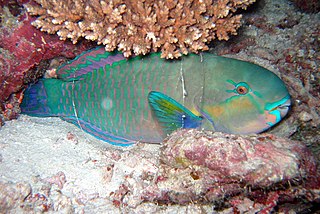
Chlorurus sordidus, known commonly as the daisy parrotfish or bullethead parrotfish, is a species of marine fish in the family Scaridae.
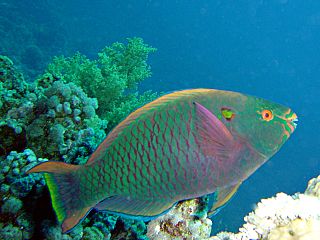
Scarus niger, common names the swarthy parrotfish, dusky parrotfish, and black parrotfish, is a species of parrotfish. It is in the phylum Chordata, class Actinopterygii, and family Scaridae. Like other members of its family, it has characteristic 10 dorsal soft rays, 9 dorsal spines, 9 anal soft rays, and 3 anal spines, It is found in Indo-West and Central Pacific, from the Red Sea, north to Japan, south to Australia and east to French Polynesia. It is found in lagoons, channels and outer reefs slopes on the depths of 2 to 20 metres. The dusky parrotfish often lives in solitude, but males may also live in a small group of mating females. The dusky parrotfish is primarily herbivorous, and its main source of food is benthic algae. At maturity, the fish is approximately 230-240mm long and weighs around 240g.

Hipposcarus harid, the Longnose parrotfish or Candelamoa parrotfish, is a species of marine ray-finned fish, a parrotfish from the family Scaridae found on coral reefs of Indian Ocean and the Red Sea.
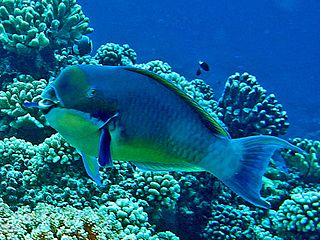
Chlorurus microrhinos, the blunt-head parrotfish or steephead parrotfish, is a species of marine ray-finned fish, a parrotfish from the family Scaridae. It is found in the Indo-Pacific region.

Chlorurus spilurus, known commonly as the Pacific daisy parrotfish or Pacific bullethead parrotfish and in Hawaiian called uhu, is a species of marine fish in the family Scaridae. The Pacific daisy parrotfish is widespread throughout the tropical waters of the Pacific.
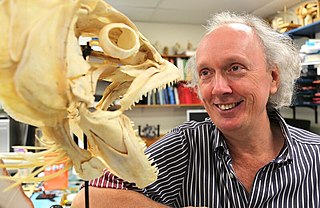
David Roy Bellwood is an Australian marine biologist. Bellwood studies the ecology, biogeography and evolution of marine fishes, and in 2016 was elected to the Australian Academy of Science.
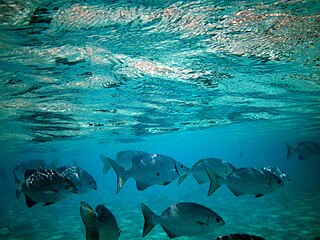
Kyphosus cinerascens is a species of marine ray-finned fish. It is a sea chub from the family Kyphosidae. Kyphosus Cinerascens has 11 dorsal fins and 12 anal fins. Kyphosus cinerascens are widely distributed in the Indo-Pacific region. The Kyphosus cinerascens has a strict diet on phaeophytes, chlorophytes, and rhodophytes, making them herbivores.



















